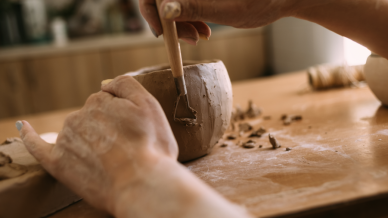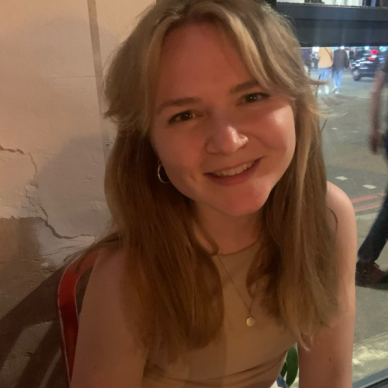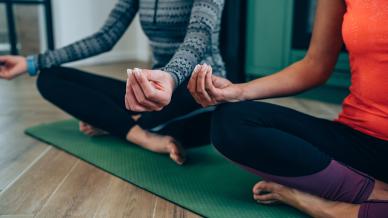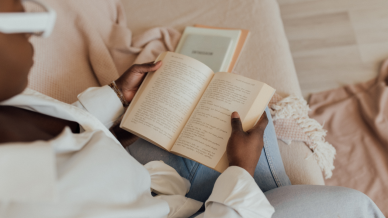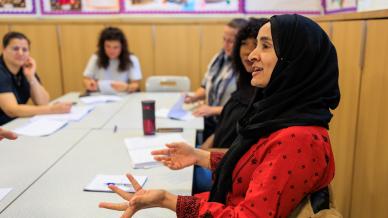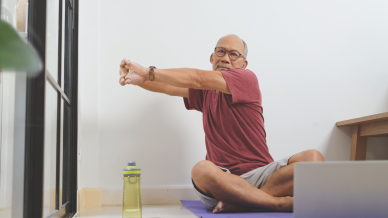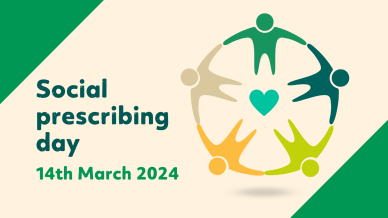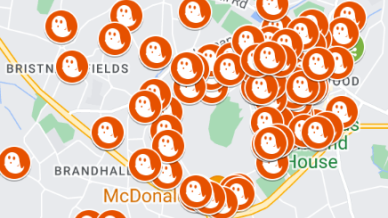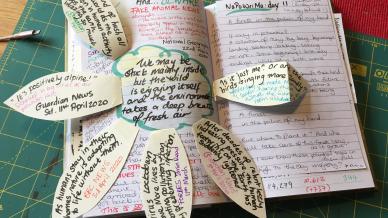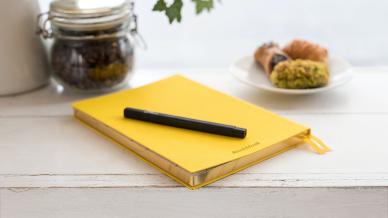It doesn't have to be something obvious like painting or acting. Your creativity can show itself much more subtly in the form of doodling in your notebook or journaling.
However, if you feel you've lost your flair, we're here to help you find and grow it. We've been talking to WEA tutor Shaun, who is giving you some tips on improving your creativity. Whether that's trying new activities or joining like-minded communities, see our steps that will help you start your creative project. Pick ideas and exercises to be more creative.
1. Find the right hobby for you
If you want to improve your creativity, start by choosing which creative path you want to pursue. Some people are more visual in their thoughts, others are quicker with words or emotions. We all think and express ourselves differently and it's all about finding the best outlet.
Unsure which outlet to pick? Feel free to try out a variety until you find the one that suits you best. Collaging, dancing, crocheting, painting, photography, cooking - whatever helps you explore your creativity counts as a creative outlet!
Once you've chosen your craft, you'll need the kit, but this doesn't have to be difficult. For writing, all you'll need is a paper and pen. You could also buy second-hand. Charity shops, eBay and Facebook Marketplace could be good.
2. Create an environment that promotes creativity
You've probably heard the saying 'clean room, clean mind'. Well, the same can be said for creativity. Shaun suggests "an ambient soundscape and environment. Light should be low, preferably natural, and the temperature should hit a cosy 21°C".
If this seems hard, why not pop your favourite upbeat tunes on? Also, it's a good idea to make sure the space around you is free from clutter and any distractions.
3. Break through the creative barriers
If it doesn't come naturally, finding ways to be more creative can feel like a struggle. Shaun suggests that you could start by searching online for inspiration.
"Take drawing an ‘anime cat’ for example; I could Google this and see what others have produced. I could then piece together what I like, before returning to the task with renewed motivation. I feel energized."
Remember, we're not in school and you won't be 'marked down' for copying an image you like. Creativity doesn't have to come from a blank slate. You're doing this for yourself so you can do whatever you want. You may replicate the image in a sketch; adopt the colours into your sewing project; or make something entirely different.
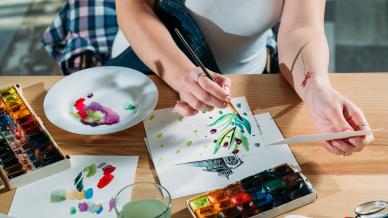
4. Listen/ read/ watch things to develop your creativity
To help grow your creativity, you could pick up habits that will help you stay creatively stimulated. You could try listening to podcasts in the craft you're interested in. Or just ones that make you think or smile.
Look into Youtube videos of people explaining different areas on the topic. See if there are any TV shows, films or documentaries. Maybe there are some books or magazines that will give you a better understanding. Expand your knowledge of the area and let the ideas flow.
5. Stick with your habits
For something to become a habit, it's crucial that you stick to it. Try practising your craft for at least half an hour every day. It may seem like a lot of time, but it is not when you consider how much time we spend watching TV or using phones.
When you're short on time, you could make a note of your ideas, doodle any designs or practice a certain technique. Organising tools and watching/ reading about the subject can also count.
6. Join a community
If you're uncertain about what it is you want to learn, why not search for local online classes? You'll learn new skills and share stories and tips on how to be more creative in life.
If you're searching for ideas, check out WEA's arts and crafts courses here. We teach classes online or in person. You might find something that catches your interest.
7. Don't beat yourself up if you're feeling uncreative
Once you begin your creative journey, you're likely to be surprised at how quickly your creativity grows. Not just in your project but also in your daily life. However, not every day can be a creative one. Some days you may feel full of ideas while others can feel exhausting.
Perhaps your mind is busy thinking about work, chores or the hundred other things you need to do. Don't let this discourage you or lead you to think you're starting all over again. Give yourself some time to unwind, make yourself a cup of tea or go outside for a few minutes. When you come back, see if this helps you.
8. Appreciate the result
As you're working on your project, be sure to congratulate yourself! It's easy for us to be our own worst critic, but Shaun notes the importance of showing yourself kindness and gratitude. "Rephrase any negative thoughts that may have arisen. Instead of ‘the eyes look terrible’, say ‘next time I want to work on drawing eyes I am happier with’."
Learning from a project is okay, but don't let it dampen your hard work. Also, recognise how you feel. Of course, it's great to have made something that you're proud of. But the real result is the emotional and mental benefits that being creative has had.
Take the time to appreciate the way you feel and perhaps show your work to your friends and family. Get compliments for the hard work you put in before starting on your next project.
